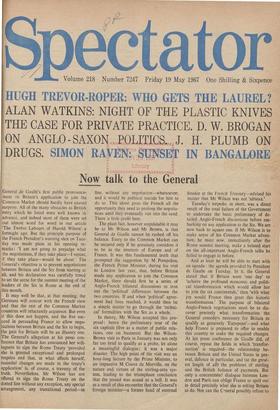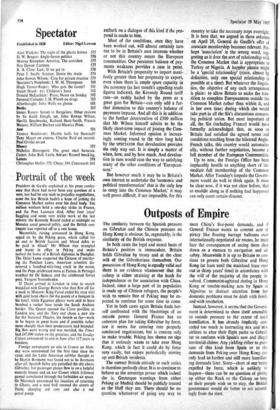Now talk to the General
General de Gaulle's first public pronounce- ment on Britain's application to join the Common Market should hardly have caused surprise. All of the many obstacles to British entry which he listed were well known in advance, and indeed most of them were set out almost word for word in our article `The Twelve Labours of Harold Wilson' a fortnight ago. But the principle purpose of the French President's warning shot on Tues- day was made plain in his opening re- marks: 'I am not going to prejudge what the negotiations, if they take place—I repeat, if they take place—would be about.' The General's objective is to prevent negotiations between Britain and the Six from starting at all, and his declaration was carefully timed to set the scene for the summit meeting of the leaders of the Six in Rome at the end of this month. fine, without any negotiation—whatsoever; and it would he political suicide for him to do so: This alone iaives the French all the opportunity they need to prolong the negotia- tions until they eventually run into the sand. There is little profit here.
The plain fact, however unpalatable it may be to Mr Wilson and Mr Brown, is that General de Gaulle cannot be rushed off his .balance. Entry to the Common Market can be secured only if he genuinely considers it to be in the interests of Europe and of France. It was this fundamental truth that prompted the suggestion by M Pompidou, the French Prime Minister, during his visit to London last year, that, before Britain made any application to join the Common Market, there should first be a series of Anglo-French bilateral discussions to iron out the 'political' differences between the two countries. If and when 'political' agree- ment had been reached, it would then be a simple matter to go through the 'techni- cal' formalities with the Six as a whole.
In theory. Mr Wilson accepted this pro- posal: hence the preliminary tour of the six capitals (five as a matter of public rela- tions, one on business). But the Wilson- Brown visit to Paris in January was not only far too brief to qualify as a probe, let alone a meaningful dialogue; it was a major disaster. The high point of the visit was an hour-long lecture by the Prime Minister, to an impassive M Couve de Murville, on the nature and virtues of the sterling-area sys- tem, leading to the triumphant conclusion that the pound was sound as a bell. It was as a result of this encounter that the General's foreign minister–La fdtmer head Of external finance at the French Treasury—advised his master that Mr Wilson was not `serieux.'
Tuesday's torpedo, in short, was a direct result of the total failure of the Government to undertake the basic preliminary of de- tailed Anglo-French discussions before em- barking on any application to the Six. We are now back to square one. If Mr Wilson is to make sense of his Common Market adven- ture, he must now, immediately after the Rome summit meeting, make a belated start on the all-important Anglo-French talks he failed to engage in before. embark on a dialogue of this kind if the pro- posal is made to him.
Most of the conditions, once they have been worked out, will almost certainly turn out to be in Britain's own interests whether or not this country enters the European communities. Our persistent balance of pay- ments weakness provides a case in point.
With Britain's propensity to import mani- festly greater than her propensity to export, even when there is ample spare capacity in the economy (as last month's appalling trade figures indicate), the Kennedy Round tariff cuts—so rashly hailed by the press as a great gain for Britain—can only add a fur- ther dimension to this country's balance of payments impasse. And all this is in addition to the further deterioration of £500 million that Mr Wilson himself admits to be the likely short-term impact of joining the Com- mon Market. Informed opinion is increas- ingly coming round to the view long held by the SPECTATOR that devaluation provides the only way out. It is simply a matter of when, how, and by how much. And devalua- tion in turn would ease the way to satisfying many of the other conditions of 'European- ness.'
But however much it may be in Britain's own interest to undertake the 'economic and political transformation' that is the only key to entry into the Common Market,' it may well prove difficult, if not impossible, for this country to take the necessary steps overnight. It is here that, we argued in these columns on April 28, General de Gaulle's offer of associate membership becomes relevant. Per- haps 'association' is the wrong word, sug- gesting as it does the sort of relationship with the Common Market that is appropriate to Turkey or Nigeria. A happier phrase might be a 'special relationship' (since, almost by definition, only one special relationship is possible at a time). But whatever the linguis- tics, the objective of any such arrangement is plain: to allow Britain to make the tran- sition to complete Europeanness outside the Common Market rather than within it, and in her own time; during which she would take part in all the Six's discussions concern- ing political union. But most important of all, the Six (including France) would hay e formally acknowledged that, as soon as Britain had satisfied the agreed terms and conditions resulting from the bilateral Anglo- French talks, this country would automatic- ally, without further negotiation, become a full member of the European Communities.
Up to now, the Foreign Office has been implacably hostile to anything short of im- mediate full membership of the Common Market. After Tuesday's torpedo the Govern- ment would do well to think again. It must be clear now, if it was not clear before, that to muddle along as if nothing had happened can only court certain disaster.



































